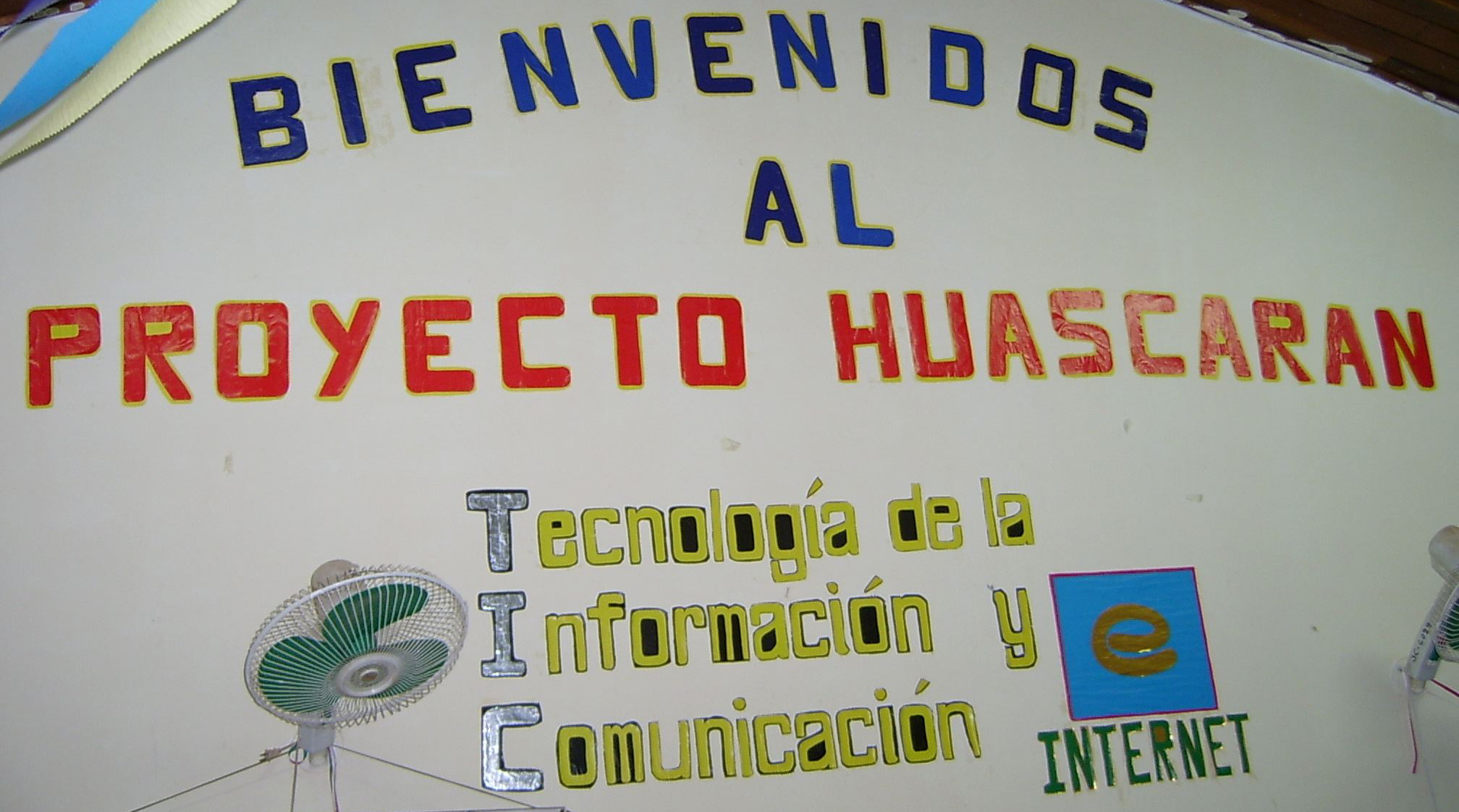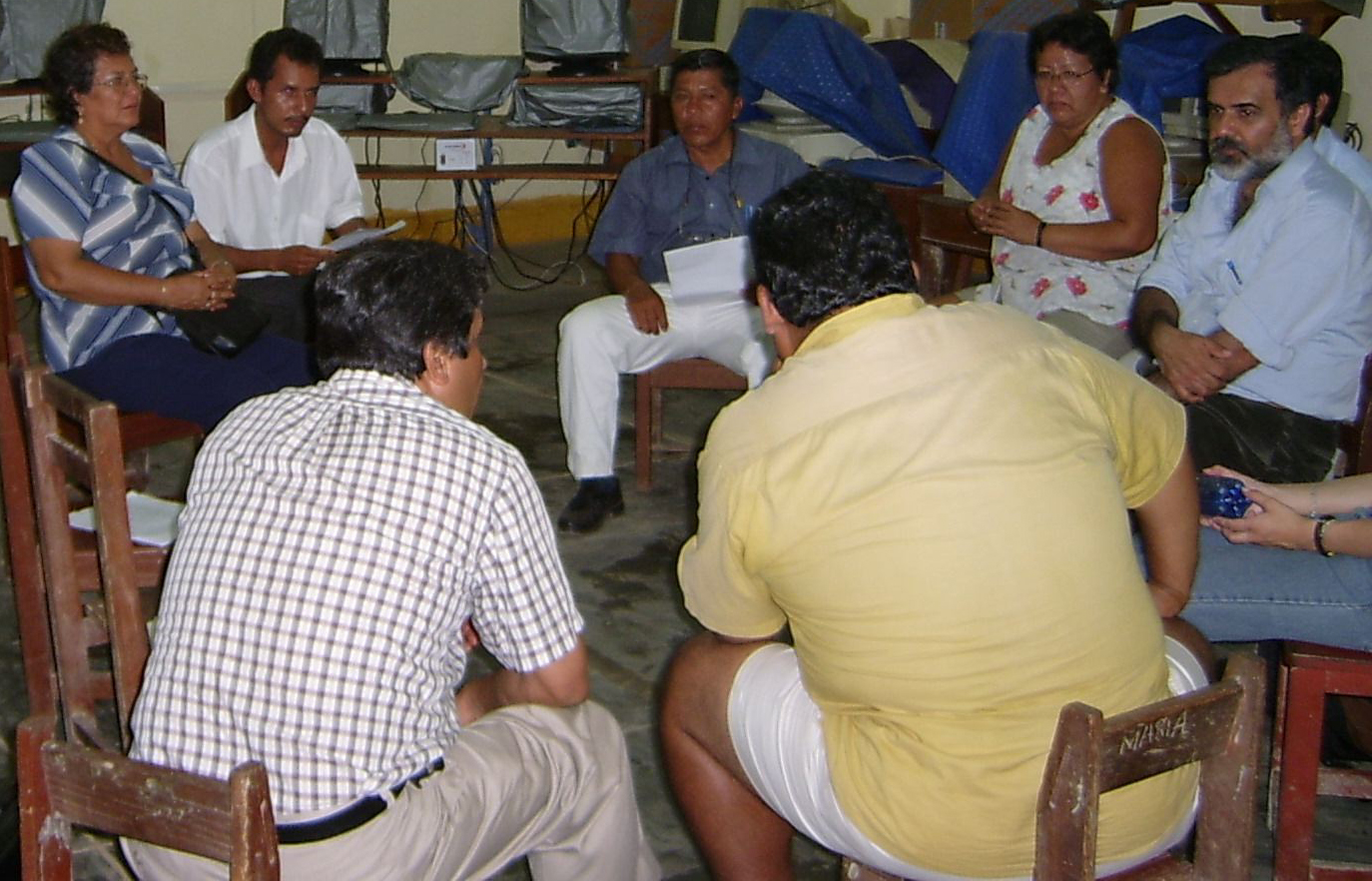Strengthening Teaching Practices through Information and Communication Technologies
Using technology to support instructional innovation in Peru
June 2004
A Question of Quality

"Welcome to the Huascaran Project" sign in Ucayali, Peru.
In a country where the education system is highly centralized and instruction is primarily teacher-centered, academic achievement, especially for rural girls, is unimpressive. Despite significant investment in bringing technology to the classroom, education quality remains low. Results from a 1998 Latin American assessment of education quality revealed that Peruvian fourth graders ranked second to last in mathematics achievement. While total enrollment rates for primary school are strong for girls and boys (net enrollment of 92%), the quality of basic education is lacking. Sonia Arias, Project Director, explains: “What we need to ensure is that the technology supports quality education and doesn’t unwittingly replicate outdated models of learning—we need to use information communication technology to support active, student-centered learning”.
"What we need to ensure is that the technology supports quality education"
Catalyzing Change: Integrating ICTs into Learning
Building on the Government’s nascent efforts to improve education quality in rural schools by providing materials, equipment and infrastructure, the Education Development Center (EDC) is working with the Ministry of Education to improve instructional strategies. Under President Toledo, the Ministry of Education launched the Huascarán Project, an ambitious program aimed at improving education quality in urban and rural primary and secondary schools. Recognizing the potential of the Huascarán Project to improve quality, EDC has partnered with the Ministry and Boston-based Concord Consortium to implement a pilot program of instructional innovations that incorporates technology-based components with local learning environments. According to EDC General Project Director, Daniel Light, “The partnership provides a unique opportunity to strengthen pedagogy by encouraging teachers to diversify their instructional strategies away from rote memorization and experiment with project-based learning.”
"…Something happened to me today that has never happened before…I felt the desire and the motivation to communicate with you, to go online and read your comments."
- Alipio, a participating teacher
EDC understands that changing teaching practices and developing a culture of using communication tools is especially difficult in a highly centralized, low-resource environment. As such, program activities are strategically designed to introduce new concepts that gradually build on each other. Concepts taught in face-to-face workshops on creating classroom-based collaborative projects are revisited and reassessed in online workshops on the same topic. Similarly, online workshops on effectively creating virtual communities of practice are immediately followed by a complementary face-to-face workshop. This face-to-face workshop, focusing on gender equity in using ICTs will be supported with follow-up online discussions. Thus far, the structure has proven effective. During one online discussion, participating teacher Alipio Luis Carhuallanqui described how the virtual community had impacted him: “…Something happened to me today that has never happened before…I felt the desire and the motivation to communicate with you, to go online and read your comments. The comments felt alive and made me laugh and reflect…I feel that you have all become my friends…”
Overcoming Challenges: Reaching Hard to Reach Populations
Program activities are taking place in rural primary schools and teacher training centers across three geographically distinct regions in the highland and jungle areas. Linguistic differences, geographic distance, limited infrastructure and minimal computer training present a variety of challenges. According to Light, “Overcoming these challenges requires continued support at the national and international level. We’re relying on the Minister of Education, USAID and our local staff to encourage the national telephone company and other donor organizations so that computers are delivered, servers are up and the Internet is connected.”
Instructional Designer, Alvaro Galvis from Concord Consortium has scheduled program activities to account for the poor infrastructure and limited computing skills on the part of teachers. Online workshops are staggered throughout the project, with technology ready schools participating in the first round, and regional coordinators are providing computer skills training in schools where

Participants engage in teacher training workshops in Ucayali
computer labs are up and running. “In Ucayali, the regional
coordinator is leading computer skills workshops every Saturday,”
reports National Coordinator, Rocio Flores. Teachers are also finding it
difficult to grasp the concept of collaborative projects. According to Light,
“One year is a short time horizon to ensure that teachers grasp the
concept well enough to actually change their teaching practices, but we
hope to continue providing support wherever it is needed.”
Scaling Up: Reaching Out to a Larger Community
Despite the challenges, EDC and its partners are encouraged that the project
will yield positive results. The constant stream of positive feedback from
participating teachers keeps project stakeholders encouraged. After visiting
the three regions, Flores found that, “The majority of participating
teachers were enthusiastic about the project and wanted to learn more.”
The problem in Peru is not a lack of motivation on the part of the teachers,
but rather a problem of limited resources and scarce funding. EDC hopes
that their efforts will at least partially alleviate these problems. While
reaching a larger audience will undoubtedly magnify existing challenges,
EDC is confident that increased Ministry buy-in and growing demand from
the teachers will lead the government to expand the project to rural schools
throughout the country.
For more information, please contact:
- EDC Project Director (IES), Sonia Arias, sarias@edc.org
- EDC Instructional Designer (CCT), Daniel Light, dlight@edc.org
- Concord Consortium Instructional Designer, Alvaro Galvis, alvaro@concord.org
